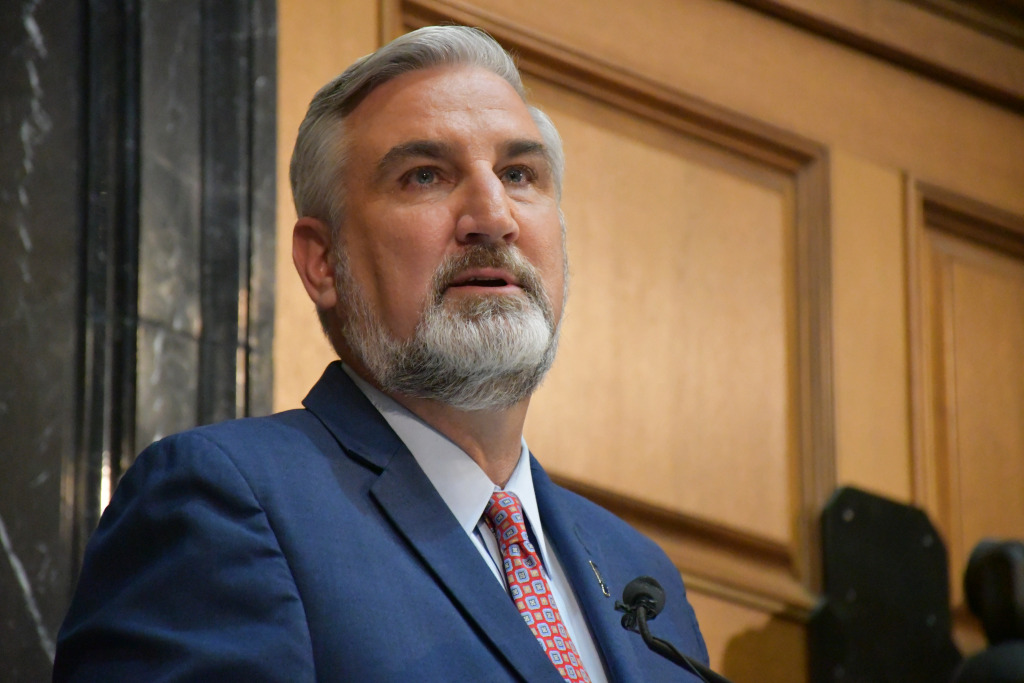Subscriber Benefit
As a subscriber you can listen to articles at work, in the car, or while you work out. Subscribe NowA flurry of bills were signed into law by Gov. Eric Holcomb Thursday, bringing the total number of bills to reach his desk to 93. Even as he finished, lawmakers finalized another handful of bills as they near the legislative deadline.
The 79 bills Holcomb signed touched nearly every aspect of Hoosier lives, from legalizing throwing stars to creating an inventory of “lost” farmland used for other purposes.
Some will only impact smaller populations, such as a bill that would ease access to transcripts for college graduates, another that would simplify the application for food benefits for impoverished seniors and a ban on gender-affirming surgeries for inmates.
One hotly debated bill facing bipartisan opposition was House Enrolled Act 1186, which creates a 25-foot “buffer zone” around police officers. Proponents said the measure would protect law enforcement in the course of their duties but others worried it would limit accountability and criminalize concerned parents who intervened during their child’s arrest.
What’s coming next?
As of Thursday, Holcomb had no other bills awaiting his signature but afternoon sessions in each chamber means he’ll soon have more.
In the Senate, senators voted unanimously to concur on Senate Bill 1, a bill to shore up the state’s mental health crisis system. However, the funding for that measure hasn’t yet been determined. It is at the top of the list following a rosy revenue forecast on Wednesday.
Meanwhile — despite ongoing pushback from consumer and environmental advocates — Indiana lawmakers gave their final approval for a bill that critics say would stifle competitive markets and add unnecessary costs to energy infrastructure projects.
House Bill 1420 narrowly advanced 55-39 from the House to the governor’s desk, with bipartisan opposition.
Still, Democrats had the power to vote the bill down. Nine members from the caucus voted in favor, however.
House Minority Leader Rep. Phil GiaQuinta, D-Fort Wayne, did not comment specifically on the “yes” votes from some Democrats, but he said those who voted no — including himself — did so in the interest of protecting consumers.
“Incumbent” Indiana utility companies already have a “right of first refusal” to build, own, and operate new transmission lines in their service area. But the bill expands that to inter-regional transmission projects. This prevents new projects from being competitively bid on by other energy companies outside of that territory that would then retain an ownership stake.
Bill author Rep. Ed Soliday, R-Valparaiso, maintained Thursday that the ultimate goal of the legislation is to ensure better cost control for the utility companies and lower rates for customers.
“For us, when you’re the number one state in the country for GDP and manufacturing, utility rates really matter,” said GOP House Speaker Todd Huston.
But opposing voices argued the proposal would stifle innovation, while also increasing costs for Hoosier ratepayers. They held that — without a comprehensive competitive bidding process — certain utilities would have even greater power to restrict competition and raise rates.
“It’s really a matter of whether you favor competition or monopoly,” said Rep. Matt Pierce, D-Bloomington. “With competition, you have an opportunity for lower rates. With monopoly, you’re going to lock yourself into higher rates when it comes to paying for these transmission lines.”
What’s left?
Several proposals are still on the table, including the state’s two-year budget – which will likely be one of the last bills to be finalized. The House and Senate negotiations will include whether to expand voucher eligibility and Medicaid funding.
A handful of bills still outstanding, some of which are priorities for either caucus, have conference committees scheduled next week or had one in the last few days. Those measures include health care pricing bills, a two-year tax commission and revolving loans to incentivize the construction of housing.
Lawmakers must finish by April 29 under Indiana statute.
The Indiana Capital Chronicle is an independent, not-for-profit news organization that covers state government, policy and elections.
Please enable JavaScript to view this content.

